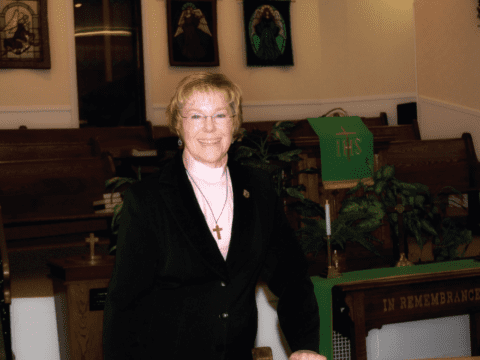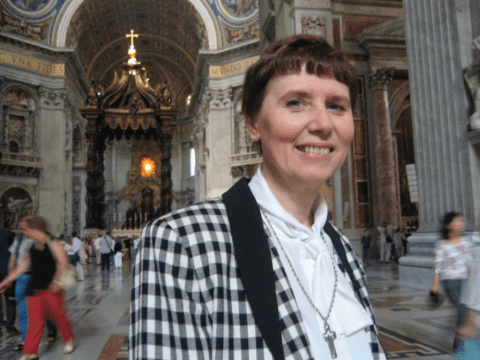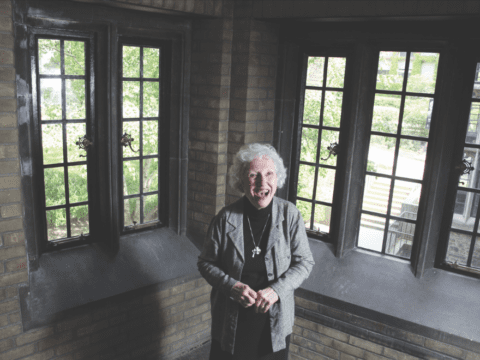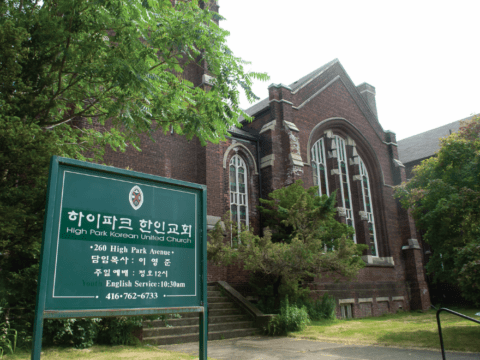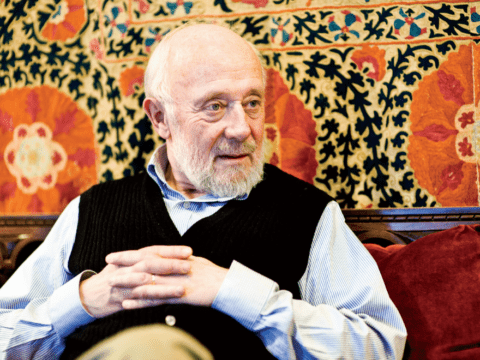Vanderbilt University professor Amy-Jill Levine is a member of an Orthodox synagogue and one of the world’s leading New Testament scholars. She discusses the current state of Jewish-Christian relations with David Wilson.
DAVID WILSON: In a sense, you have made Jewish-Christian dialogue your life’s work. How did you get started?
AMY-JILL LEVINE: I grew up in a neighbourhood right outside New Bedford, Massachusetts, that was almost totally Roman Catholic. Whenever I got the chance, I went to church with my friends. For me, it was very much like going to synagogue — it was men speaking in a language I didn’t understand, but I found it inspirational and beautiful.
When I was seven, I became convinced that I needed to take my first holy communion. But my parents said I couldn’t because I was Jewish. I couldn’t quite figure out why that would be a problem. To me, Christianity was very much like Judaism — we worshipped the same God, we took authority from the same book, we loved our neighbours as ourselves. And Christians thought a Jewish man named Jesus was very important. But the closest I got to holy communion was giving Necco wafers to my Barbie doll when I dressed her up as a bride.
A little later that year, a girl on the school bus said to me, “You killed our Lord.” She had been told that by her priest. So now I’m responsible for the death of God, and I’m totally traumatized. I started asking questions.
DW: And I take it you’ve been asking questions ever since?
AJL: Yes. I know at an intellectual level why Christians develop negative views of Jews and Judaism. I know the biblical grounding for this prejudice. I know the theology behind it. It’s harder to understand why Jews of good will and Christians of good will — who are aware of the problems of bigotry — nevertheless end up saying things that convey negativity.
DW: You describe yourself as a “Yankee Jewish feminist who teaches in a Protestant divinity school in the buckle of the Bible Belt.” How useful is humour in overcoming obstacles between two great faiths?
AJL: Humour can break some of the tension. If you can get people laughing with you, then it’s easier to explain the problems we have. Humour is also who I am. I like to laugh. There’s enough sadness in the world — I’m basically a pessimistic person. Every time somebody provides me with a joyous moment, I’m delighted.
DW: What is it that makes you so pessimistic?
AJL: I think that generally we are flawed, sinful people. We’re more interested in promoting our own agendas than carefully attending to our neighbours. I don’t think we in the 21st century are a whole lot better than we were when we were coming out of the caves.
DW: So we’re not taking seriously the message of our great faiths?
AJL: I think we claim to be, but there are far too many people who make the claim on the Jewish Sabbath or Sunday morning in church and then go out, and either by commission or omission, don’t do what they claim they want to do. I’m not saying everyone goes out and does evil, but I do think that we fail to care for our neighbours. The Epistle of James, which I think is a fabulous epistle, says faith without works is dead. I think that ought to be posted everywhere.
DW: How would you characterize the state of Jewish-Christian relations in North America today?
AJL: In some locations it’s spectacularly good. In other locations it’s dreadful. Much also depends on what we’re talking about. Interfaith services and pulpit exchanges can be very productive. We’re less good in North America when we’re talking about the broadly defined relationship between the churches and the Jewish community —conversations about the Middle East, for example.
Religious ignorance is a problem. We don’t know enough about each other. And we don’t know enough about ourselves. We have some work to do in our own traditions in order fully to engage the other.
DW: How much of the problem can be attributed to scriptural illiteracy?
AJL: Scriptural illiteracy is high, but so is illiteracy when it comes to the interpretation of Scripture. It’s helpful to know Jewish Scripture in order to understand Judaism, but we cannot read Leviticus and know what’s going on in the local synagogue. I’ve had people ask me if Jews in urban areas need zoning variances in order to sacrifice animals. Their view was that Judaism equals Leviticus, and if Leviticus says this is what you must do, then that’s what Mrs. Goldberg down the street must be doing. So both scriptural illiteracy and illiteracy regarding the ongoing traditions, and indeed the diversity within the ongoing traditions, are problems.
DW: Increasingly, the issue of anti-Semitism and the use of the term seem to be linked to the situation in the Middle East. And it’s affecting the relationship between Christians and Jews. Who owns the term?
AJL: Nobody owns it, and it’s impossible to define. For some, it’s anti-Semitic to speak out against anything Israel does that’s related to territory claimed by Palestinians. For others, it’s anti-Semitic not to speak out because what’s happening is a contradiction of Jewish values. So the term simply becomes a rhetorical weapon that people hurl at each other. I’d like to hold a moratorium on it. I also think the term has been cheapened.
If you want to see solid anti-Semitism, where there’s no question, go look at a death camp. Auschwitz is a good example. Complaining about Israeli policy is not comparable to putting Jews in ovens.
DW: Have you ever found yourself challenged for your views on this?
AJL: Sure. I’ve been accused of being anti-Semitic by both Jews and Christians. Some of the staunchest supporters of Israeli expansion into disputed areas are Christians. And that brings up another problem when we talk about Jewish-Christian relations. With which Jews, and with which Christians, is the discussion occurring?
DW: You could say that question loomed over the difficulties the United Church and the Canadian Jewish Congress went through recently. The church provided a small start-up grant to another Jewish group that is highly critical of Israel.
AJL: Likely members of your church would find it highly problematic were a Jewish group to fund some Christian group that stood for something you did not like. That’s a problem of not hearing through each other’s ears, of not putting yourself in someone else’s position. You know who the mainstream Jewish groups are in Canada. If you deliberately ignore them, you do so at your peril, in the same way that a Jewish group who deliberately ignored your church would be foolish.
DW: To what extent to you think Christian-Jewish relations are affected by church statements on the Middle East?
AJL: Christians producing statements don’t always know how their words sound to Jewish ears. What seems to make perfectly good sense and sounds benign inside a particular church can sound truly awful when it’s heard from the outside. It would not hurt church groups considering these statements to consult with official Jewish bodies— and not just one. Talk with local rabbis and with academics who understand this material, and ask, “Is our point phrased in such a way that we have clarity rather than bigotry? Have we expressed our point in such a way that we could not possibly be accused of being unfairly biased or insensitive to matters of concern to the Jewish community?”
DW: Let’s move away from institutions and talk about the grassroots. It’s pretty clear that some degree of anti-Semitism is entrenched in our communities. Should churches try to root it out?
AJL: Considering you’re a church and proclaim that God became incarnate in a Jew, I think that gives you a very nice opening! You can be both proactive and reactive. One church is unlikely to change all of Canadian society, but one sermon can change one person. That’s not a bad start. In terms of being reactive, if churches aren’t on the vanguard of bringing justice, I don’t know who else will be. If someone says or does something offensive, I don’t see why the local minister shouldn’t speak up. I would expect the local rabbi to do the same if someone made an anti-Christian comment. Christians do not have a lock on prejudice. We all have housekeeping to do. Until we can look at someone who is the “other”— whether it’s by ethnicity, race, gender, height or whatever — and say that person, too, is an image of God, then we haven’t achieved what our religions, Judaism and Christianity, say is the basis of who we are.
***
This story first appeared in The United Church Observer’s May 2010 issue with the title “‘We don’t know enough about each other or ourselves.’”










